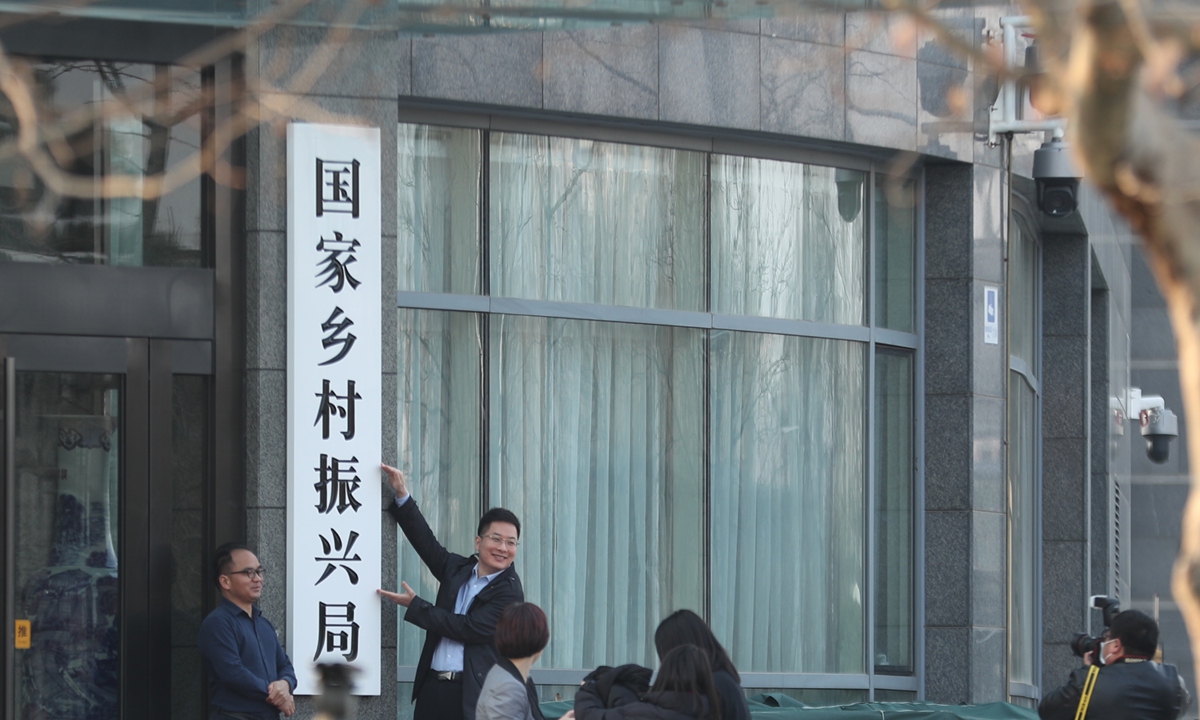
Photo: cnsphoto
China launched a new government body for the promotion of rural vitalization on Thursday, marking overall victory in the battle against poverty and a starting point of fulfilling rural revitalization and a new life and new struggle.
The plaque was hung on Thursday afternoon, after a national commendation conference at the Great Hall of the People in downtown Beijing to honor contributors to the country's poverty alleviation work.
The newly established government body was reshuffled by the State Council Leading Group Office of Poverty Alleviation and Development, and it will be under the charge of the Ministry of Agriculture and Rural Affairs.
Qiushi Journal published an article on February 16 titled
"The Great Miracle in the History of Human Poverty Reduction" under the byline of the new government body, the first time for the administration to enter the public sphere.
Eradicating poverty is not the end, but the starting point for a new life and a new struggle. After poverty alleviation is accomplished, the focus of Three Rural Issues (agriculture, rural areas and farmers) will be shifted to comprehensively promote rural revitalization, the administration wrote in the article.
The new administration is intended to build on the country's poverty alleviation achievements, Nie Fengying, deputy director of the Agricultural Information Institute of the Chinese Academy of Agricultural Sciences, told the Global Times on Thursday.
While it's not immediately clear what the implications of the new administration would be for China's agricultural sector, experts have a bullish outlook for agriculture-related investment opportunities.
Ensuring domestic food supplies with increased self-sufficiency and indigenous intellectual property will be high on the government's agenda, suggesting tremendous opportunities - notably in seed breeding, according to Nie.
The central government unveiled the "No. 1 Document" for 2021 earlier in February, renewing its emphasis on boosting grain output and food security.
The yield level of China's soybean and corn crops is less than 60 percent of the US rates, and imported storable tomatoes and bell peppers account for over 50 percent, Zhang Taolin, vice minister of the Ministry of Agriculture and Rural Affairs, disclosed at a press conference in Beijing on Monday.
The efficiency of hog reproduction, the feed conversion rate and the annual milk yield only hit roughly 80 percent of the global advanced level.
In addition to the type of seeds, the protection of seed resources and core technologies in seed breeding lag behind those of most advanced countries, according to the official.
In addition, with the country focusing more on sustainable and inclusive growth, green and ecologically friendly farming that is set to benefit rural residents is expected to be a major area of development, Nie reckoned.
Instead of following the path prevailing in the West that tends to turn villages into densely populated cities, China has been pushing for an integration of its rural regions into cities, she went on to say, noting there is vast untapped potential for wide-ranging investment to remake rural China into a welcoming place to live.
That would mean commitments to rural infrastructure, tourism and culture, among other spheres requiring an uplift to bring the rural economy on par with its urban counterpart, the expert suggested.




